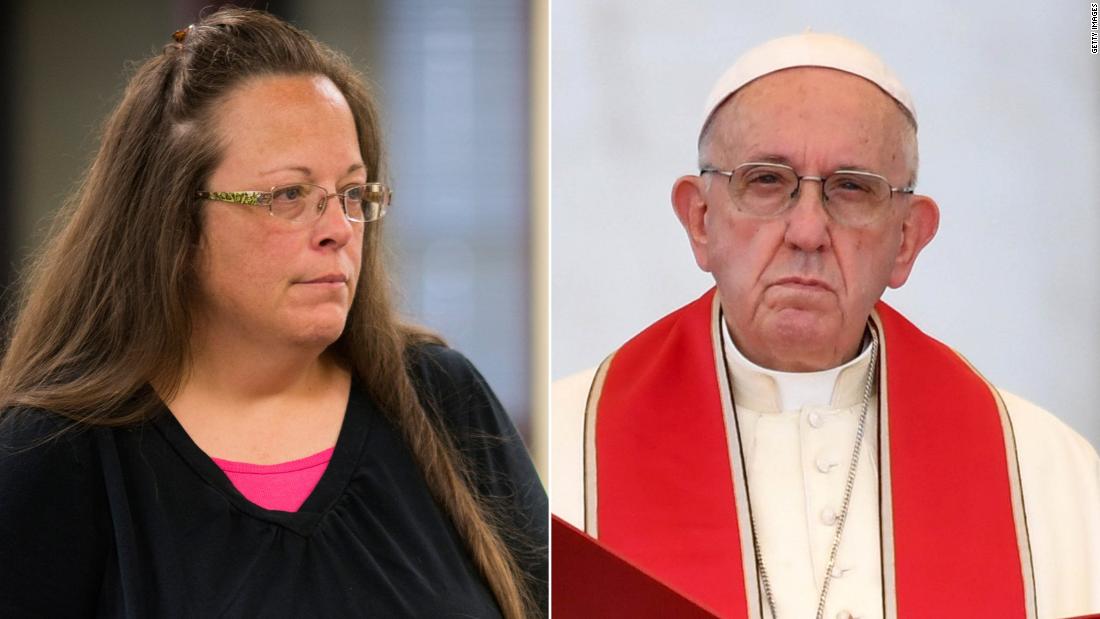
In a letter published Saturday on LifeSiteNews.com, a conservative Catholic website, Archbishop Carlo Maria Vigano, the former Vatican ambassador to the United States, said that several high-ranking church officials, including the Pope, knew in advance of the meeting and the controversy that could ensue if it become public.
During the Pope's 2015 trip to the United States, he tried, for the most part, to avoid stepping directly into the country's bitter culture wars. Davis, who cited her Christian faith in refusing to validate same-sex marriages, had become a cause célèbre in those wars, with prominent conservative politicians and religious leaders rallying to her side. Davis said the Pope urged her to "stay strong."
After news of the meeting between Davis and Francis leaked, the Vatican tried to downplay the encounter. "Such brief greetings occur on all papal visits and are due to the Pope's characteristic kindness and availability," former Vatican spokesman the Rev. Federico Lombardi said in 2015.
Privately, Vatican officials told CNN and other news outlets that the meeting irked Pope Francis, saying that he didn't know the specifics of Davis' situation before the meeting.
Juan Carlos Cruz, a sexual abuse survivor from Chile who met with the Pope in Rome in May, told the New York Times this week that Francis told him, "I did not know who the woman was and he (Viganò) snuck her in to say hello to me — and of course they made a whole publicity out of it. And I was horrified and I fired that nuncio."
In a text message to CNN on Saturday, Cruz confirmed his account of the Pope's words. Vatican spokesman Greg Burke has not responded to multiple requests from CNN for comment.
"One of them is lying: either Cruz or the Pope?" Vigano wrote on Saturday. "What is certain is that the Pope knew very well who Davis was, and he and his close collaborators had approved the private audience."
Vigano, who served as Vatican ambassador from 2011-2016, has himself emerged as a controversial figure, especially since accusing the Pope and other Vatican officials of weaving a "conspiracy of silence" in a public letter published last Sunday.
In the letter, Vigano called on Pope Francis to resign, saying he was part of a "cover up" involving former Cardinal Theodore McCarrick, whom the Pope forced to resign last month after accusations of sexual misconduct with seminarians and allegations that he abused a minor in the 1970s.
McCarrick has not commented on the accusations involving seminarians and has said he is innocent of the charge that he abused a minor.
Now 89, McCarrick, retired as archbishop of Washington in 2006. Vigano alleges that former Pope Benedict XVI knew of the accusations against McCarrick and had placed restrictions on him in 2009 or 2010.
Vigano also said he told Francis that there is "thick" dossier about the accusations in McCarrick's files at the Vatican's Congregation for Bishops, but Francis did nothing about it.
Since Vigano's "testimony," photographic and video evidence has surfaced showing McCarrick preaching and appearing at church events, even one in which Vigano himself praised McCarrick, when the restrictions were supposed to be in place.
Others have argued that Vigano's testimony should be viewed skeptically because he disagrees with Pope Francis on important church matters and may be bitter over the way he stepped down in 2016.
Vigano's accusations have divided the US Catholic bishops, with some vouching for Vigano's character and calling for an investigation into the charges and others, such as Cardinal James Tobin of Newark saying they are based on "factual errors, innuendo and fearful ideology."
Cardinal Daniel DiNardo, president of the US Conference of Catholic Bishops, said, "The recent letter of Archbishop Carlo Maria Viganò brings particular focus and urgency to this examination. The questions raised deserve answers that are conclusive and based on evidence. Without those answers, innocent men may be tainted by false accusation and the guilty may be left to repeat sins of the past."
The Vatican has not responded to requests for comments about Vigano's accusations.
"I will not say a single word about this," the Pope told reporters asking for his response to Vigano's charges last Sunday. "I believe the statement speaks for itself. And you have the sufficient journalistic ability to make your conclusions. It's an act of trust."
In his letter on Saturday, Vigano acknowledges that he set up the meeting between the Pope and Davis, saying he gave Francis a one-page memo about the Kentucky clerk's case one day before their encounter on Sept. 24, 2015.
Vigano also said he consulted with two high-ranking officials in the Holy See's Secretariat of State -- Archbishop Paul Gallagher and Archbishop Angelo Becciu -- before the meeting and gained their approval.
Gallagher has not immediately responded to CNN's request for comment. Becciu could not immediately be reached for comment on Saturday.
Amid the furor that followed the meeting between Davis and the Pope, Vigano said he was called to Rome, where Cardinal Pietro Parolin, the Vatican's Secretary of State, told him to expect a papal tongue-lashing.
But when he talked to the Pope, Vigano said, Davis was not mentioned. In fact, Vigano says, the Pope praised him for the success of his visit to the United States.
No comments:
Post a Comment